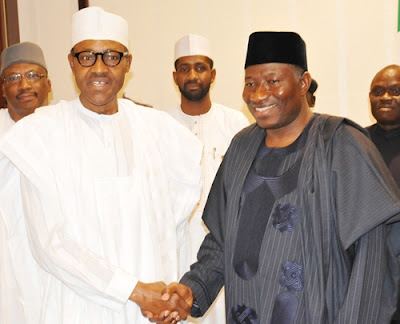Buhari's Apology to Jonathan
Then one day you ran into each other and exchanged the obligatory pleasantries of how do you do? To your surprise, the person launches into an oblique confessional about having become a changed person or now seeing the world differently. In effect, the person was not-so-courageously saying, “Sorry, I was wrong.” It is arguable that President Muhammadu Buhari just did that to his predecessor, Goodluck Jonathan.
During election campaign in 2015, Buhari was rhetorically unkind to Jonathan, squarely placing all of Nigeria’s problems on Jonathan’s shoulders, everything from the Boko Haram menace to the raging poverty. In various ways, he called him inept, indecisive, irresponsible, and, of course, corrupt. If only Buhari was elected, Nigeria’s woes would be gone, he pleaded. He made that case most notably in a lengthy address at London’s Chatham House in February 2015.
On Boko Haram: “Let me assure you that if I am elected president, the world will have no cause to worry about Nigeria as it has had to recently…. We will always act on time and not allow problems to irresponsibly fester, an I,Muhammadu Buhari, will always lead from the front and return Nigeria to its leadership role in regional and international efforts to combat terrorism.”
On the economy: “After the rebasing exercise in April 2014, Nigeria overtook South Africa as Africa’s largest economy. Our GDP is now valued at $510 billion and our economy rated 26th in the world. Also on the bright side, inflation has been kept at single digit for a while and our economy has grown at an average of 7% for about a decade.
“But it is more of paper growth, a growth that, on account of mismanagement, profligacy and corruption, has not translated to human development or shared prosperity.”
On equity: “The … current administration has created two economies in one country, a sorry tale of two nations: one economy for a few who have so much in their tiny island of prosperity; and the other economy for the many who have so little in their vast ocean of misery.”
On his solution: “In the face of dwindling revenues, a good place to start the repositioning of Nigeria’s economy is to swiftly tackle two ills that have ballooned under the present administration: waste and corruption. And in doing this, I will, if elected, lead the way, with the force of personal example.”
What these excerpts say definitively is that leadership is the primary agent of change. But in his recent address to launch the administration’s “Change begins with me” campaign, the me is no longer the leadership but the people. Here are the opening paragraphs:
“I welcome you all to this important occasion of the launching of the National Re-orientation Campaign, called ‘Change Begins With Me’. Nigeria today is passing through a challenging moment where hardly anything works in a normal manner. Many have attributed this phenomenon to the total breakdown of our core values over the years.
“It is safe to say today that honesty, hard work, Godliness have given way to all kinds of manifestations of lawlessness and degeneration in our national life. This is why we have among our cardinal objectives ‘change’, which implies the need for a change of attitude and mindset in our everyday life.”
In effect, Buhari says, it is not leadership that transforms society, it is the changing values of the people. It stands to reason that buried inside this apparent recalibration is an apology to Jonathan. Where Buhari had earlier castigated him for all of Nigeria’s ills, he now says, “Sorry, my brother, it wasn’t you.”
Buhari’s apology actually began with his Independence Day speech last year. “To bring about change, we must change ourselves by being law-abiding citizens,” he had said.
In now stressing the role of values in societal change, Buhari is actually straddling a long simmering debate among developmental economists, sociologists and political scientists. The issue of contention is the question: What is the primary driving agent of societal development, is it sound leadership or the values of the people?
The late Chinua Achebe famously weighed decidedly on the side of leadership in his often cited book, The Problem With Nigeria. That view has long attained the status of an aphorism in Nigeria. And it is the dominant perspective among Western analysts.
But no less an intellectual heavyweight than Max Weber has led the contrary argument. The late 19th/early 20th century Germany sociologist linked the rise of capitalism to the Protestant ethic, or more specifically the Calvinist version. It was an ethic that encouraged both frugality and capital accumulation. This contrasts with Catholicism with its emphasis on piety and charity.
Buhari’s switch — or straddling — on this debate, actually gets my nod. My sympathy lies more with the values argument, as I elaborate on in my book The African Press, Civic Cynicism, and Democracy. It is not that I discount the importance of leadership in the advancement of society, but because the values argument is not accorded its place in popular discourse.
Where Buhari — politicians in general — err is in not being forthright in what they can do and what they can’t do. At least be a little more so. Rather than promising the improbable, they could espouse their principles, hopes and goals, with the caveat that they would accomplish only what they could. Alas, that is not politically alluring.
Jonathan’s apology to Buhari
One promise the Buhari administration has not flipped on is the prosecution of corruption. The probe has now indisputably reached former President Jonathan’s doors with the admission by his wife that frozen bank accounts with a combined $31.5 million belong to her. As reported by the Associated Press, the former first lady’s lawyer wrote to the Economic and Financial Crimes Commission that $15 million of that was for medical expenses she incurred in London in 2013. That raises the question of how she paid the expenses in the first place.
We have always known that Dame Patience was no ordinary first lady. What we didn’t know was that she had $31.5 million to her accounts to back up her irrepressible flair. The question now is what former President Jonathan knew about the largesse and when he knew it. Perhaps as he accepts Buhari’s apology, he will tender one in return.
About the Author:
Minabere Ibelema teaches undergraduate courses in news and feature writing, editing, mass media law, University of Alabama at Birmingham, and a columnist for Punch Newspapers.



Comments